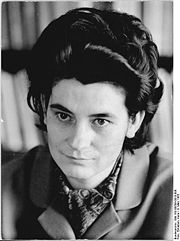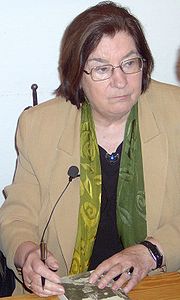
Christa Wolf
Encyclopedia


Novel
A novel is a book of long narrative in literary prose. The genre has historical roots both in the fields of the medieval and early modern romance and in the tradition of the novella. The latter supplied the present generic term in the late 18th century....
ist, and essay
Essay
An essay is a piece of writing which is often written from an author's personal point of view. Essays can consist of a number of elements, including: literary criticism, political manifestos, learned arguments, observations of daily life, recollections, and reflections of the author. The definition...
ist. She is one of the best-known writers to have emerged from the former East Germany.
Biography
Wolf was born in Landsberg an der WartheGorzów Wielkopolski
Gorzów Wielkopolski is a city in western Poland, on the Warta river. It is the biggest city in the Lubusz Voivodeship with 125,149 inhabitants...
in the Province of Brandenburg
Province of Brandenburg
The Province of Brandenburg was a province of the Kingdom of Prussia and the Free State of Prussia from 1815 to 1946.-History:The first people who are known to have inhabited Brandenburg were the Suevi. They were succeeded by the Slavonians, whom Henry II conquered and converted to Christianity in...
; the city is now Gorzów Wielkopolski, Poland. After World War II
World War II
World War II, or the Second World War , was a global conflict lasting from 1939 to 1945, involving most of the world's nations—including all of the great powers—eventually forming two opposing military alliances: the Allies and the Axis...
, Wolf and her family, being Germans, were expelled
Expulsion of Germans after World War II
The later stages of World War II, and the period after the end of that war, saw the forced migration of millions of German nationals and ethnic Germans from various European states and territories, mostly into the areas which would become post-war Germany and post-war Austria...
from their home on what had become Polish territory. They crossed the new Oder-Neisse border
Oder-Neisse line
The Oder–Neisse line is the border between Germany and Poland which was drawn in the aftermath of World War II. The line is formed primarily by the Oder and Lusatian Neisse rivers, and meets the Baltic Sea west of the seaport cities of Szczecin and Świnoujście...
in 1945 and settled in Mecklenburg
Mecklenburg
Mecklenburg is a historical region in northern Germany comprising the western and larger part of the federal-state Mecklenburg-Vorpommern...
, in what would become the German Democratic Republic
German Democratic Republic
The German Democratic Republic , informally called East Germany by West Germany and other countries, was a socialist state established in 1949 in the Soviet zone of occupied Germany, including East Berlin of the Allied-occupied capital city...
, or East Germany. She studied literature
Literature
Literature is the art of written works, and is not bound to published sources...
at the University of Jena and the University of Leipzig
University of Leipzig
The University of Leipzig , located in Leipzig in the Free State of Saxony, Germany, is one of the oldest universities in the world and the second-oldest university in Germany...
. After her graduation, she worked for the German Writers' Union and became an editor for a publishing company. She joined the Socialist Unity Party of Germany
Socialist Unity Party of Germany
The Socialist Unity Party of Germany was the governing party of the German Democratic Republic from its formation on 7 October 1949 until the elections of March 1990. The SED was a communist political party with a Marxist-Leninist ideology...
in 1949 and left it in 1989–90. Stasi
Stasi
The Ministry for State Security The Ministry for State Security The Ministry for State Security (German: Ministerium für Staatssicherheit (MfS), commonly known as the Stasi (abbreviation , literally State Security), was the official state security service of East Germany. The MfS was headquartered...
records found in 1993 showed that she worked as an informant (Inoffizieller Mitarbeiter) during the years 1959–61. The Stasi officers criticized what they called her "reticence", and they lost interest in her cooperation. She was herself then closely watched for nearly 30 years. During the Cold War
Cold War
The Cold War was the continuing state from roughly 1946 to 1991 of political conflict, military tension, proxy wars, and economic competition between the Communist World—primarily the Soviet Union and its satellite states and allies—and the powers of the Western world, primarily the United States...
, Wolf was openly critical of the leadership of the GDR, but she maintained a loyalty to the values of Karl Marx
Karl Marx
Karl Heinrich Marx was a German philosopher, economist, sociologist, historian, journalist, and revolutionary socialist. His ideas played a significant role in the development of social science and the socialist political movement...
and opposed German reunification
German reunification
German reunification was the process in 1990 in which the German Democratic Republic joined the Federal Republic of Germany , and when Berlin reunited into a single city, as provided by its then Grundgesetz constitution Article 23. The start of this process is commonly referred by Germans as die...
.
Wolf's breakthrough as a writer came in 1963 with the publication of Der geteilte Himmel (Divided Heaven
Divided Heaven
Divided Heaven is a German novel written by Christa Wolf in 1963. The author describes society and problems in the German Democratic Republic in the '60s. The book won the Heinrich Mann Prize, and has been translated into many different languages.- History :Rita and Manfred are an East German...
). Subsequent works included Nachdenken über Christa T. (The Quest for Christa T.
The Quest for Christa T.
The Quest for Christa T. is a 1968 novel by German writer Christa Wolf that follows two childhood friends from the second World War into the 1960s in East Germany. Stylistically it demonstrates a subjectivist experimentation in prose characteristic of GDR literature of the 1960s....
) (1968), Kindheitsmuster (Patterns of Childhood) (1976), Kein Ort. Nirgends (1979), Kassandra
Cassandra (novel)
Cassandra was written by East German author Christa Wolf in 1984. It has since been translated into a number of languages...
(Cassandra) (1983), Störfall (Accident) (1987), Medea
Medea
Medea is a woman in Greek mythology. She was the daughter of King Aeëtes of Colchis, niece of Circe, granddaughter of the sun god Helios, and later wife to the hero Jason, with whom she had two children, Mermeros and Pheres. In Euripides's play Medea, Jason leaves Medea when Creon, king of...
(1996), and Auf dem Weg nach Tabou (On the Way to Taboo) (1994). Christa T was a work that—while briefly touching on a disconnection from one's family's ancestral home—was concerned with a woman's experiencing overwhelming societal pressure to conform.
Cassandra
Cassandra (novel)
Cassandra was written by East German author Christa Wolf in 1984. It has since been translated into a number of languages...
is perhaps Wolf's most important book, re-interpreting the battle of Troy as a war for economic power and a shift from a matriarchal to a patriarchal society. Was bleibt (What Remains), described her life under Stasi surveillance, was written in 1979, but not published until 1990. Auf dem Weg nach Tabou (1995; translated as Parting from Phantoms) gathered essays, speeches, and letters written during the four years following the reunification of Germany
German reunification
German reunification was the process in 1990 in which the German Democratic Republic joined the Federal Republic of Germany , and when Berlin reunited into a single city, as provided by its then Grundgesetz constitution Article 23. The start of this process is commonly referred by Germans as die...
. Her latest work, Leibhaftig (2002) describes a woman struggling with life and death in 1980s East-German hospital, while awaiting medicine from the West. Central themes in her work are German fascism, humanity, feminism, and self-discovery.
Wolf died 1 December 2011 in Berlin, where she lived with her husband, Gerhard Wolf.
Reception
Wolf's works have sometimes been seen as controversial since German reunificationGerman reunification
German reunification was the process in 1990 in which the German Democratic Republic joined the Federal Republic of Germany , and when Berlin reunited into a single city, as provided by its then Grundgesetz constitution Article 23. The start of this process is commonly referred by Germans as die...
. Upon publication of Was bleibt, West German critics such as Frank Schirrmacher argued that Wolf failed to criticize the authoritarianism of the East German Communist regime, whilst others called her works "moralistic". Defenders have recognized Wolf's role in establishing a distinctly East German literary voice. With his study of Christa Wolf’s earlier novels and with subsequent essays on her later works Fausto Cercignani
Fausto Cercignani
Fausto Cercignani is an Italian scholar, essayist and poet.- Biography :Born to Tuscan parents, Fausto Cercignani studied in Milan, where he graduated in foreign languages and literatures with a dissertation dealing with English at Shakespeare’s time...
has contributed to promote an awareness of the true essence of the narrative production of the East German writer, irrespective of her political and personal ups and downs. The emphasis placed by Cercignani on Christa Wolf’s heroism has opened the way to subsequent studies in this direction.
Wolf received the Heinrich Mann Prize
Heinrich Mann Prize
The Heinrich Mann Prize is a literary award given annually by the Berlin Academy of Art . The prize given for works with socially critical aspects in a character that would honor Heinrich Mann...
in 1963, the Georg Büchner Prize
Georg Büchner Prize
The Georg Büchner Prize is the most important literary prize of Germany. It was created in 1923 in memory of Georg Büchner and was only given to artists who came from or were closely tied to Büchner's home of Hesse...
in 1980, and the Schiller Memorial Prize
Schiller Memorial Prize
The Schiller Memorial Prize is a literature prize of the State ofBaden-Württemberg. It is presently endowed with 25,000 Euros and has been awarded since 1955 on Friedrich Schiller's birthday, 10 November. The prize acknowledges outstanding work in the field of German literature or intellectual...
in 1983, the Geschwister-Scholl-Preis
Geschwister-Scholl-Preis
The Geschwister-Scholl-Preis is a literary prize which was initiated in 1980 by the State Association of Bavaria in the Stock Market Society of the German Book Trade and the city of Munich...
in 1987, as well as other national and international awards. Since reunification, Wolf has received further awards: in 1999 she was awarded the Elisabeth Langgässer
Elisabeth Langgässer
Elisabeth Langgässer was a German author and teacher. She is known for lyrical poetry and novels...
Prize and the Nelly Sachs Literature Prize
Nelly Sachs Prize
The Nelly Sachs Prize is a literary prize given every two years by the German city of Dortmund. It is named after the Jewish poet Nelly Sachs and includes a cash award of €15,000...
, and Wolf became the first recipient of the Deutscher Bücherpreis
Deutscher Bücherpreis
Deutscher Bücherpreis is a literary prize of Germany....
(German Book Prize) in 2002 for her lifetime achievement.
External links
- Christa Wolf: Biography at FemBio - Notable Women International
- The quest for Christa Wolf an interview with Hanns-Bruno Kammertöns and Stephan Lebert about private chats with Honecker, a German society in check mate, the influence of Goethe, the shortcomings of Brecht, and the lasting effects of Utopia at signandsight.com.

